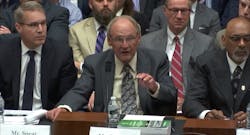Need to address detention time a rare point of agreement at House hearing
Two hours into a House subcommittee hearing on trucking, Rep. Bruce Westerman (R-AR) read off a list of issues a panel of industry officials, labor representatives, advocacy groups and law enforcement could not agree on.
From the safety impacts of electronic logging devices and flexibile hours-of-service rules to whether there is actually a driver shortage, the eight witnesses offered a wide range of competing ideas.
If there was one area of consensus during the June 12 hearing before House Subcommittee on Highways and Transit, however, it was that excessive detention time truckers often face at shippers’ docks is a safety and economic problem that can't be ignored.
Todd Spencer, executive director of the Owner-Operators Independent Drivers Association (OOIDA) said excessive wait times at shippers’ facilities can often mean truck drivers are putting in an 80-hour work week, but are not fairly compensated for that additional time.
The frustration is compounded by these same drivers being charged high penalties for being as little as 15 minutes late for a scheduled drop-off due to traffic.
Spencer called the current system for truckers “broken,” so it should not be a surprise many are exiting the industry after quickly finding out that people are “working their tails off and not getting ahead.”
The hearing was the third held by the subcommittee as it begins to consider highway reauthorization legislation. The current federal highway funding law expires next year.
In her opening statement, Rep. Eleanor Holmes Norton (D-DC), chair of the subcommittee, said increasing truck-involved highway fatalities over the past decade shows the nation “must do more to save lives.” She called for a better safety measurement system and stricter training rules for those seeking to obtain a CDL.
She also expressed concern about the “appalling working conditions” some truckers face, including delays at shippers’ facilities.
Shippers do need to do more to boost the velocity at their facilities, said Rodney Noble, senior director for transportation, global procurement, for PepsiCo. Speaking on behalf of the company that is a shipper but also runs a larger private fleet, Noble said it is important to not tie up truckers during deliveries so they can spend more time driving.
One aim of the hearing was to zero in on perceived highway safety issues involving trucks on the nation’s highways.
Rep. Steve Cohen (D-TN) and Andy Young, a truck safety advocate, stressed the importance of requiring underride guards to help prevent deadly rear-end collisions between a tractor-trailer and passenger vehicles.
While Chris Spear, CEO and president of American Trucking Associations, did not dispute the safety value of underride guards, he repeatedly positioned connectivity as the key component to safer roads.
Having vehicles communicating with each other and the surrounding infrastructure can help prevent crashes. Conversely, a products like underride guards “assume a crash is going to happen.”
Spear admitted the uptick in truck-involved fatalities is “alarming,” but reminded lawmakers the federal government continued inability to come up with highway funding solutions is partially to blame.
OOIDA’s Spencer agreed, and was one of numerous witnesses that considered the shortage of parking a critical piece of trucking’s safety and workforce woes.
Spencer also called out the irony of lawmakers who support underride guards, but whose inaction on funding is creating the environment that makes rear-end collisions more likely.
LaMont Byrd, a director with the Teamsters union, also said truck parking was inadequate. He added that alongside the need for carriers to better compensate drivers is the need for the government to invest in infrastructure so drivers can complete more hauls without encountering so much congestion.
As for the possibility of a true highway funding breakthrough, Spear said the current political disarray “raises the bar on anything getting passed.”
Rep. Peter DeFazio (D-OR), chairman of the full House Transportation & Infrastructure Committee, praised President Trump (R) for restricting the operating authority of Mexican-based motor carriers as part of the United States-Mexico-Canada Agreement (USMCA), which still needs formal approval. But he also panned the administration’s lack of a concrete infrastructure funding proposal beyond the “proliferation of tolling” at the state level.
ATA has long advocated for an increase in federal fuel taxes to prop up the Highway Trust Fund used for maintenance and repairs.
Among the other main points raised during the hearing:
Kathy Chase, president of the Advocates for Highway and Auto Safety, called for requiring more safety technologies to “ensure truck drivers have access to these life-saving systems.”
“We can and must do better,” Chase said of the estimated 12 people killed and 400 injured in truck-involved crashes each day.
While Chase said her group opposes any change to existing truck size-and-weight limits, PepsiCo’s Noble spoke out about the success the company was having in Canada hauling as much as 102,500 lbs. with an additional axle. He suggested studies show the vehicles do not create higher levels of infrastructure damage, while also reducing total emissions.
Mark Savage, deputy chief of the Colorado Highway Patrol, said the ELD mandate has consumed extensive resources among the law enforcement community. Speaking on behalf of the Commercial Vehicle Safety Alliance, he requested a limit on exemptions, and for lawmakers to make sure the requests granted are based on critical needs, and not just convenience.
Jason Craig, director of government affairs at C.H. Robinson Worldwide, spoke of the importance of the federal government to improve safety scoring systems, so brokers can more easily make sure they are hiring reputable carriers, and avoiding the “bad apples.”
About the Author
Neil Abt
Neil Abt is a former FleetOwner editor who wrote for the publication from 2017 to 2020. He was editorial director from 2018 to 2020.
